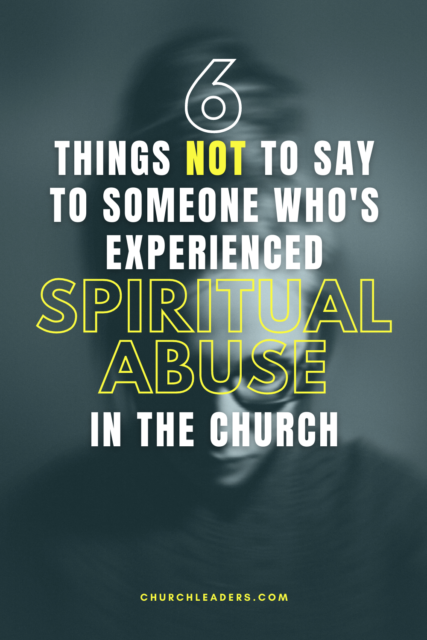If someone has been attacked by a dog, would you tell them to go back and risk getting bitten again? Christians who insist on reconciliation in the face of spiritual abuse are forgetting one important thing: Abusive people can’t always be reasoned with.
Not only is it dangerous to ask a victim to make amends with their abusers, it also puts an undue burden of responsibility on the victim to come up with a solution. It’s like saying, “They’re the ones who hurt you, but now it’s your job to make it right.”
3. “I Don’t Want to Gossip.”
If a pastor or staff member is mistreating someone in the congregation, it’s not gossip for that person to talk about it. In fact, it’s not even gossip for you to talk about it.
Imagine if you found out your brother-in-law was beating your sister. Would your first response be, “That’s none of my business”? The same way domestic abuse involves a whole family, spiritual abuse involves a whole church family. The abuse may have taken place in private, but that doesn’t make it a private matter.
As Christians, if we’re going to start taking spiritual abuse seriously, we need to stop comparing it to gossip.
4. “What Are Nonbelievers Going to Think?”
Have you ever read a headline about a Christian going public against a church or ministry and thought to yourself, “Is this providing a good witness?” If you’re more concerned about the church’s reputation than you are about the abuse itself, you might have your priorities mixed up.
As Christians, we can get so preoccupied with how outsiders view the church that we put appearances before the truth. When we try to control the narrative, we substitute the reality of the church for our own ideal of the church. All we’re showing the world is that we prefer a false witness over a bad one.
5. “Stop Being So Bitter.”
People who have been hurt by a church have a right to be angry. Not only is anger an appropriate response to injustice, it’s a healthy response if it’s channeled the right ways.
So why do Christians have such a hard time letting each other express negative emotions? Why do we always have to fish for some deeper spiritual problem like a root of bitterness or unforgiveness?
The other day I heard someone put it this way: “Religion will molest you, then accuse you of being bitter about it.” Do you see the double standard? When victims react to being hurt by someone in a church, we treat them as though there’s something’s wrong with them. This is why abusers are so often exonerated. It’s easier to justify letting the abuser off the hook if both parties are “in the wrong.”
6. “Is This Worth Dividing the Church Over?”
How it might affect the congregation should never be the deciding factor in whether or not to expose spiritual abuse in the church.
This one especially hits home for me. When I escaped my abusive situation in Africa, my pastor wanted to sweep the whole ordeal under the rug. My silence, I was told, was for the greater good of the Gospel. It wasn’t a suggestion—it was an ultimatum. If I didn’t keep quiet, he warned, I would bring division to the entire congregation.
One of the most effective ways to silence a victim is to fill them with a false sense of guilt. The victim is led to believe that talking is only going to make things worse, and whatever happens as a result is their fault.
Certainly, exposing spiritual abuse in the church can divide a congregation. But that’s not a consequence of the victim talking. It’s a consequence of the abuse perpetrated in the first place.
There’s one thing that’s even more important than knowing what not to say to someone who has been hurt by church. And that is to simply listen.













